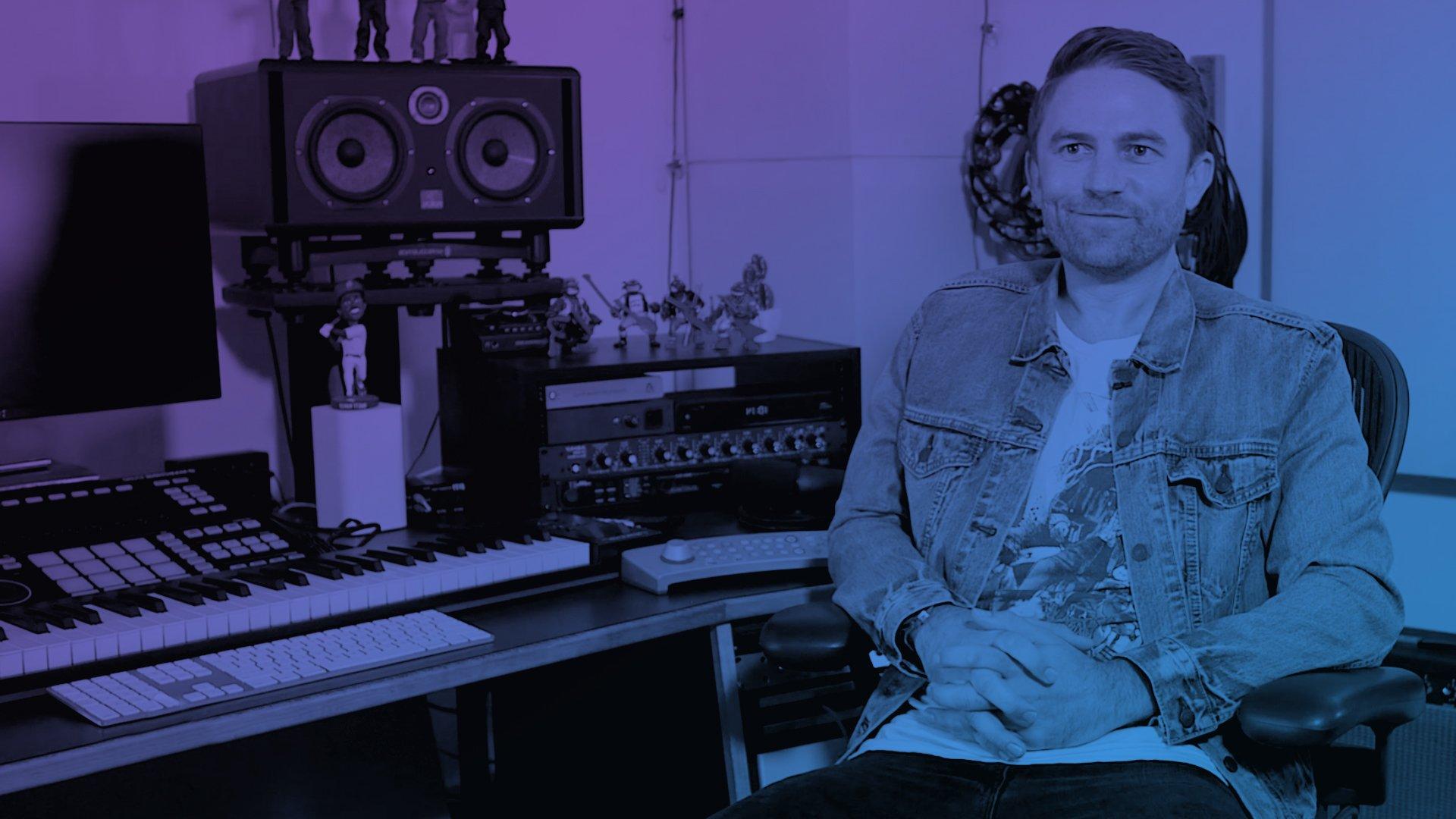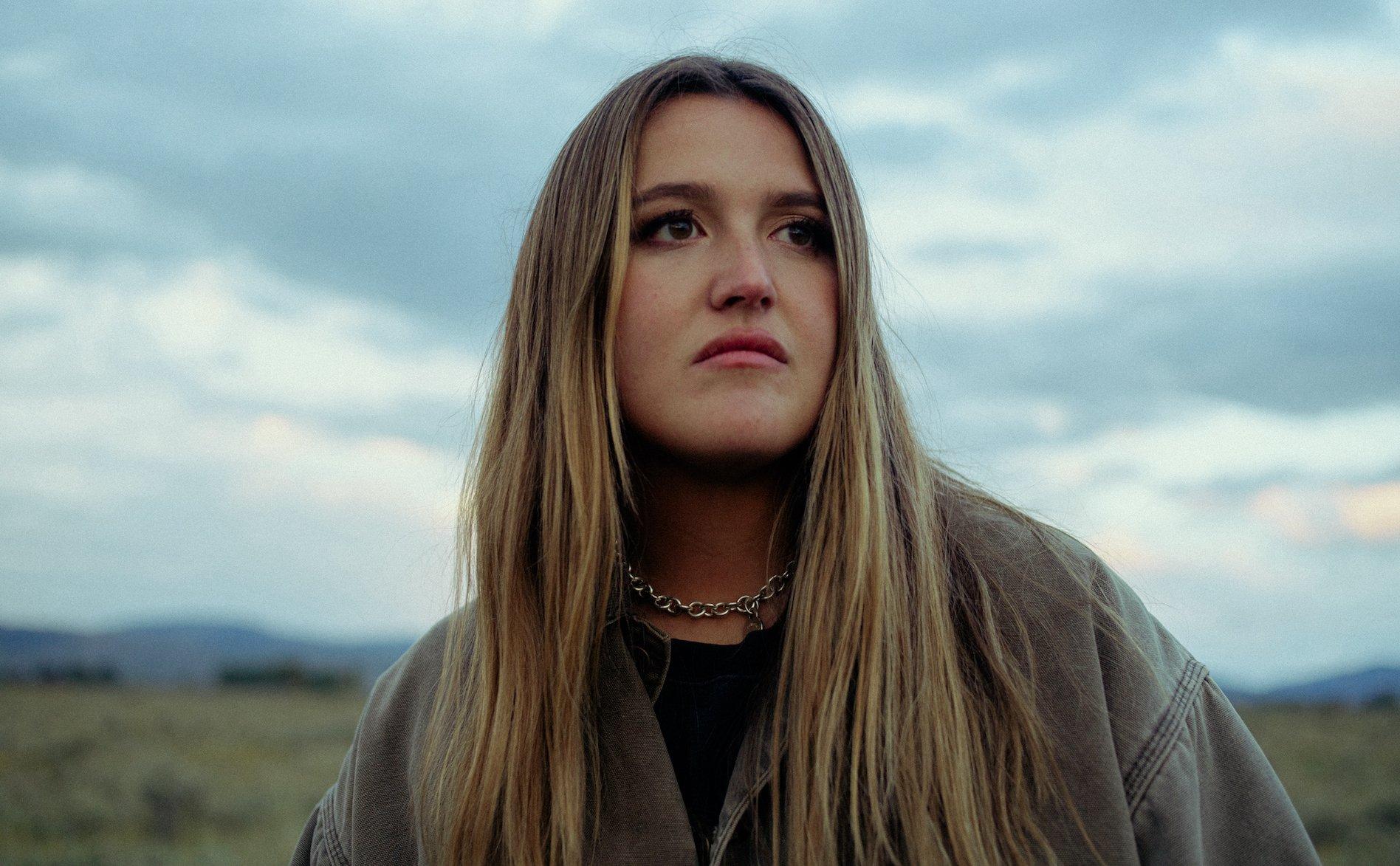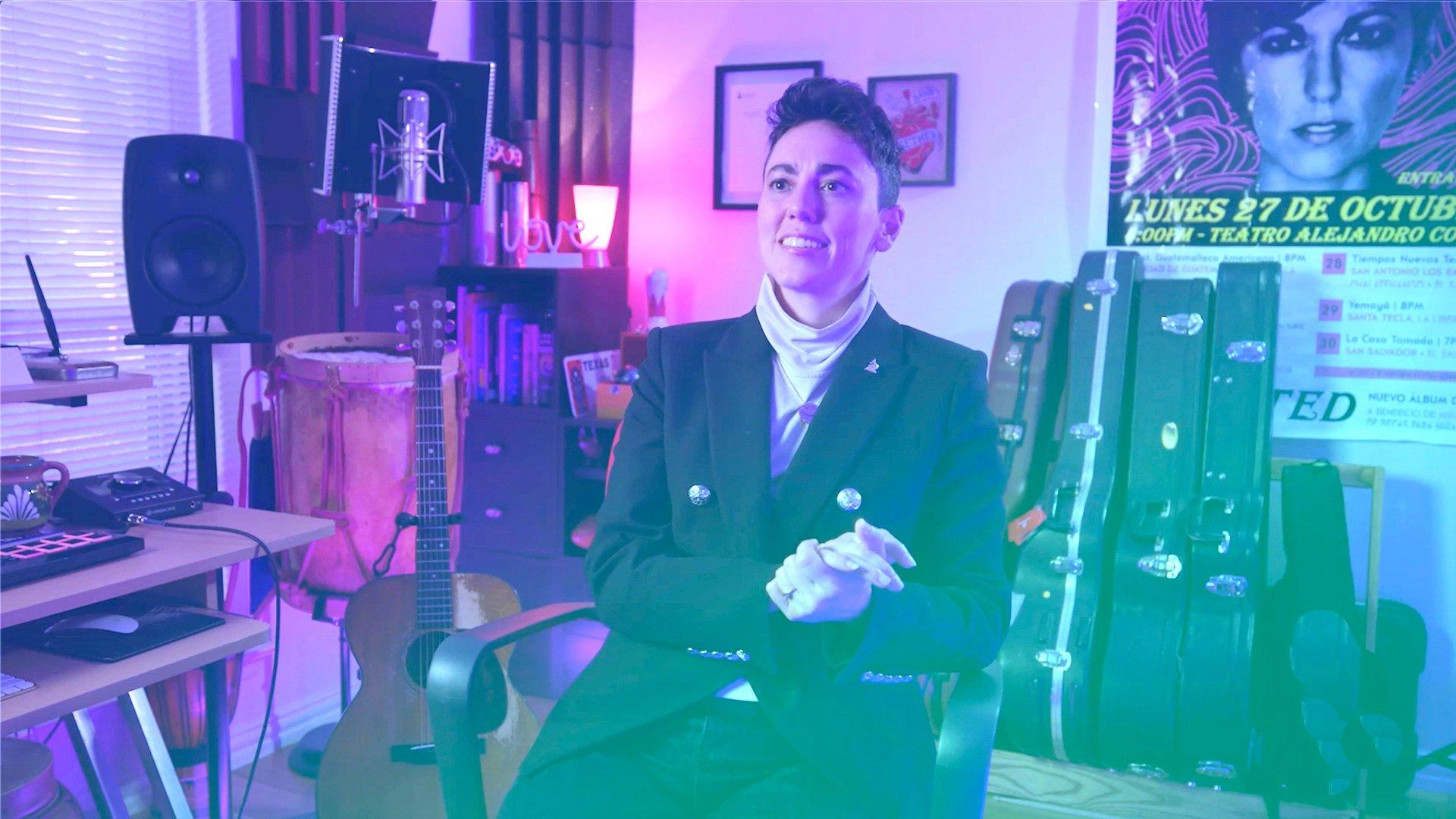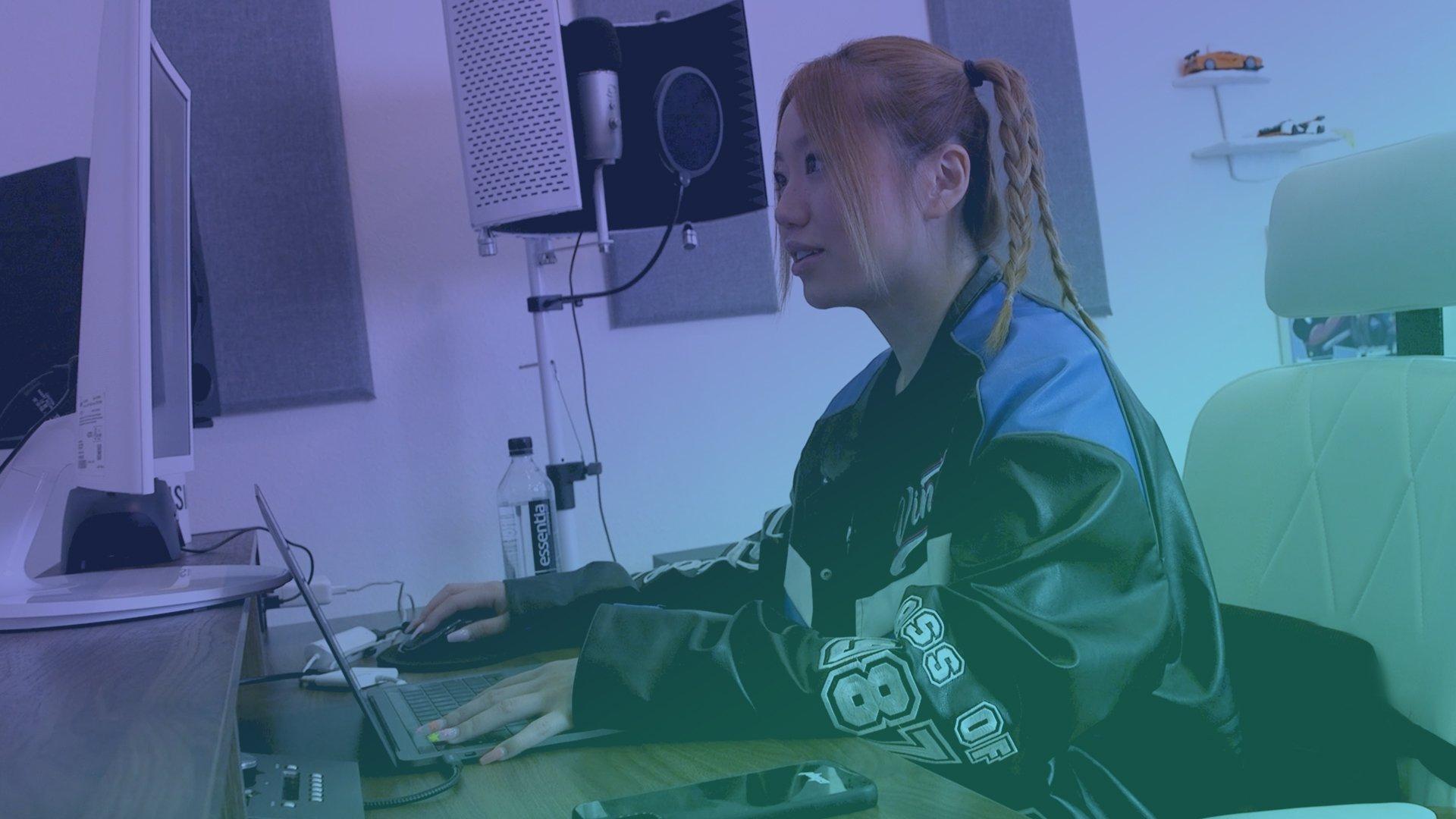Chelsea Cutler's latest album is more than music; it's a mantra.
On her third album, Stellaria, the Connecticut-born singer/songwriter encouraged herself to find beauty in the overlooked. "The biggest lesson I learned between making the album, going to therapy and just getting older has been to meet life where it's at and express gratitude for all the little things right in front of me," she tells GRAMMY.com.
The result of a two-year writing process, Stellaria dives into the delicate moments of love and existing in a post-COVID universe.
With tracks like the starry-eyed love song "Your Bones" and the heartfelt tale about feeling insufficient "I Don't Feel Alive," Cutler guides listeners through a journey of self-exploration and learning to unpack all of life's little gems.
Inspired by the likes of Florence + The Machine, Coldplay and Sam Fender, Stellaria digs deeper into Cutler's indie-pop stylings as well. The project balances electronic and acoustic sounds, from the vocalizer of "you're all i ever dreamed of" to the soft guitar chords in "Hotel June." In line with the album's live-in-the-moment theme, Cutler's Stellaria process mostly involved "paying attention to music that made me feel something, whether it was a good feeling or bad feeling."
GRAMMY.com caught up with Cutler about how Stellaria helped her become more vulnerable, hone her producing skills and tap into her love-song writing abilities.
The interview has been edited for clarity.
How do you feel you've evolved as a musician since your 2021 album, When I Closed My Eyes?
It was really an important goal for me with Stellaria to push myself lyrically, to be more mature and more deliberate with my word choices. With When I Closed My Eyes, I actually took a pretty big step back from the production. With Stellaria, it was really important to me to be across every song.
I think out of the 15 songs, I did production or co-production on 13 out of 15. As a producer, I grew and learned so much, and I really just feel like Stellaria is just leagues ahead.
That's not to say that When I Close My Eyes isn't an awesome project. I think they each reflect where I was and the growth I was experiencing at each time.
How do you feel producing your own music impacts your sound? And how important is it for you to have that kind of involvement in the creation process?
I think it's so important — for me, at least. I'm obviously biased, but I do think that the fact that I'm so involved in production definitely helps my music kind of stand alone as a more unique sound.
I think my production is so funny because I was never technically trained, and everything for me has just been a process of trial and error. And I actually think that's led to some pretty cool, happy accidents and mistakes along the way. So I honestly really love that my processes and growth are pretty clear, and I think it's led to some kind of creative and innovative choices.
It's always been a means to an end for me. I didn't know any producers when I was in college and starting to write music, but it's something I've just fallen in love with.
In your Instagram post announcing the album, you mentioned that creating this album was the most challenging creative process you’ve had thus far. Why was that?
When I started making the album, I was definitely focused on commercial goals. And as wonderful as those goals are, it's also important to have process goals.
It was challenging for me to learn that lesson, because you can't really control the commercial success so much, but what you can control is how you show up in the studio and as a collaborator. Your intention to channel your vision into something and learning to focus on that was much more fruitful and gratifying for me.
What was your inspiration behind the title Stellaria?
Stellaria is Latin and I actually took Latin for seven years. I had this idea that I wanted the album to be a departure from New York City, because so much of my career and story has just always revolved around New York. I wanted to go out West for some writing.
We ended up going to Jackson Hole, and when I was looking around, I kept seeing that word. There was a Stellaria Lane and there's a Stellaria Creek in Yellowstone, and I loved the word so much, so I looked it up and learned what it meant.
Funny enough, it's actually the technical name for chickweed, and the crazy thing is that when I would see it, I was like, This plant's kind of beautiful. It's such an overlooked thing in nature that's so beautiful. Much of this album for me was just learning to be present and notice all the incredible things around me, the small things, the little things that are so easy to overlook. It really felt fitting in so many different ways.
<blockquote class="instagram-media" data-instgrm-permalink="https://www.instagram.com/p/CyU1H7lO54e/?utm_source=ig_embed&utm_campaign=loading" data-instgrm-version="14" style=" background:#FFF; border:0; border-radius:3px; box-shadow:0 0 1px 0 rgba(0,0,0,0.5),0 1px 10px 0 rgba(0,0,0,0.15); margin: 1px; max-width:540px; min-width:326px; padding:0; width:99.375%; width:-webkit-calc(100% - 2px); width:calc(100% - 2px);"><div style="padding:16px;"> <a href="https://www.instagram.com/p/CyU1H7lO54e/?utm_source=ig_embed&utm_campaign=loading" style=" background:#FFFFFF; line-height:0; padding:0 0; text-align:center; text-decoration:none; width:100%;" target="_blank"> <div style=" display: flex; flex-direction: row; align-items: center;"> <div style="background-color: #F4F4F4; border-radius: 50%; flex-grow: 0; height: 40px; margin-right: 14px; width: 40px;"></div> <div style="display: flex; flex-direction: column; flex-grow: 1; justify-content: center;"> <div style=" background-color: #F4F4F4; border-radius: 4px; flex-grow: 0; height: 14px; margin-bottom: 6px; width: 100px;"></div> <div style=" background-color: #F4F4F4; border-radius: 4px; flex-grow: 0; height: 14px; width: 60px;"></div></div></div><div style="padding: 19% 0;"></div> <div style="display:block; height:50px; margin:0 auto 12px; width:50px;"><svg width="50px" height="50px" viewBox="0 0 60 60" version="1.1" xmlns="https://www.w3.org/2000/svg" xmlns:xlink="https://www.w3.org/1999/xlink"><g stroke="none" stroke-width="1" fill="none" fill-rule="evenodd"><g transform="translate(-511.000000, -20.000000)" fill="#000000"><g><path d="M556.869,30.41 C554.814,30.41 553.148,32.076 553.148,34.131 C553.148,36.186 554.814,37.852 556.869,37.852 C558.924,37.852 560.59,36.186 560.59,34.131 C560.59,32.076 558.924,30.41 556.869,30.41 M541,60.657 C535.114,60.657 530.342,55.887 530.342,50 C530.342,44.114 535.114,39.342 541,39.342 C546.887,39.342 551.658,44.114 551.658,50 C551.658,55.887 546.887,60.657 541,60.657 M541,33.886 C532.1,33.886 524.886,41.1 524.886,50 C524.886,58.899 532.1,66.113 541,66.113 C549.9,66.113 557.115,58.899 557.115,50 C557.115,41.1 549.9,33.886 541,33.886 M565.378,62.101 C565.244,65.022 564.756,66.606 564.346,67.663 C563.803,69.06 563.154,70.057 562.106,71.106 C561.058,72.155 560.06,72.803 558.662,73.347 C557.607,73.757 556.021,74.244 553.102,74.378 C549.944,74.521 548.997,74.552 541,74.552 C533.003,74.552 532.056,74.521 528.898,74.378 C525.979,74.244 524.393,73.757 523.338,73.347 C521.94,72.803 520.942,72.155 519.894,71.106 C518.846,70.057 518.197,69.06 517.654,67.663 C517.244,66.606 516.755,65.022 516.623,62.101 C516.479,58.943 516.448,57.996 516.448,50 C516.448,42.003 516.479,41.056 516.623,37.899 C516.755,34.978 517.244,33.391 517.654,32.338 C518.197,30.938 518.846,29.942 519.894,28.894 C520.942,27.846 521.94,27.196 523.338,26.654 C524.393,26.244 525.979,25.756 528.898,25.623 C532.057,25.479 533.004,25.448 541,25.448 C548.997,25.448 549.943,25.479 553.102,25.623 C556.021,25.756 557.607,26.244 558.662,26.654 C560.06,27.196 561.058,27.846 562.106,28.894 C563.154,29.942 563.803,30.938 564.346,32.338 C564.756,33.391 565.244,34.978 565.378,37.899 C565.522,41.056 565.552,42.003 565.552,50 C565.552,57.996 565.522,58.943 565.378,62.101 M570.82,37.631 C570.674,34.438 570.167,32.258 569.425,30.349 C568.659,28.377 567.633,26.702 565.965,25.035 C564.297,23.368 562.623,22.342 560.652,21.575 C558.743,20.834 556.562,20.326 553.369,20.18 C550.169,20.033 549.148,20 541,20 C532.853,20 531.831,20.033 528.631,20.18 C525.438,20.326 523.257,20.834 521.349,21.575 C519.376,22.342 517.703,23.368 516.035,25.035 C514.368,26.702 513.342,28.377 512.574,30.349 C511.834,32.258 511.326,34.438 511.181,37.631 C511.035,40.831 511,41.851 511,50 C511,58.147 511.035,59.17 511.181,62.369 C511.326,65.562 511.834,67.743 512.574,69.651 C513.342,71.625 514.368,73.296 516.035,74.965 C517.703,76.634 519.376,77.658 521.349,78.425 C523.257,79.167 525.438,79.673 528.631,79.82 C531.831,79.965 532.853,80.001 541,80.001 C549.148,80.001 550.169,79.965 553.369,79.82 C556.562,79.673 558.743,79.167 560.652,78.425 C562.623,77.658 564.297,76.634 565.965,74.965 C567.633,73.296 568.659,71.625 569.425,69.651 C570.167,67.743 570.674,65.562 570.82,62.369 C570.966,59.17 571,58.147 571,50 C571,41.851 570.966,40.831 570.82,37.631"></path></g></g></g></svg></div><div style="padding-top: 8px;"> <div style=" color:#3897f0; font-family:Arial,sans-serif; font-size:14px; font-style:normal; font-weight:550; line-height:18px;">View this post on Instagram</div></div><div style="padding: 12.5% 0;"></div> <div style="display: flex; flex-direction: row; margin-bottom: 14px; align-items: center;"><div> <div style="background-color: #F4F4F4; border-radius: 50%; height: 12.5px; width: 12.5px; transform: translateX(0px) translateY(7px);"></div> <div style="background-color: #F4F4F4; height: 12.5px; transform: rotate(-45deg) translateX(3px) translateY(1px); width: 12.5px; flex-grow: 0; margin-right: 14px; margin-left: 2px;"></div> <div style="background-color: #F4F4F4; border-radius: 50%; height: 12.5px; width: 12.5px; transform: translateX(9px) translateY(-18px);"></div></div><div style="margin-left: 8px;"> <div style=" background-color: #F4F4F4; border-radius: 50%; flex-grow: 0; height: 20px; width: 20px;"></div> <div style=" width: 0; height: 0; border-top: 2px solid transparent; border-left: 6px solid #f4f4f4; border-bottom: 2px solid transparent; transform: translateX(16px) translateY(-4px) rotate(30deg)"></div></div><div style="margin-left: auto;"> <div style=" width: 0px; border-top: 8px solid #F4F4F4; border-right: 8px solid transparent; transform: translateY(16px);"></div> <div style=" background-color: #F4F4F4; flex-grow: 0; height: 12px; width: 16px; transform: translateY(-4px);"></div> <div style=" width: 0; height: 0; border-top: 8px solid #F4F4F4; border-left: 8px solid transparent; transform: translateY(-4px) translateX(8px);"></div></div></div> <div style="display: flex; flex-direction: column; flex-grow: 1; justify-content: center; margin-bottom: 24px;"> <div style=" background-color: #F4F4F4; border-radius: 4px; flex-grow: 0; height: 14px; margin-bottom: 6px; width: 224px;"></div> <div style=" background-color: #F4F4F4; border-radius: 4px; flex-grow: 0; height: 14px; width: 144px;"></div></div></a><p style=" color:#c9c8cd; font-family:Arial,sans-serif; font-size:14px; line-height:17px; margin-bottom:0; margin-top:8px; overflow:hidden; padding:8px 0 7px; text-align:center; text-overflow:ellipsis; white-space:nowrap;"><a href="https://www.instagram.com/p/CyU1H7lO54e/?utm_source=ig_embed&utm_campaign=loading" style=" color:#c9c8cd; font-family:Arial,sans-serif; font-size:14px; font-style:normal; font-weight:normal; line-height:17px; text-decoration:none;" target="_blank">A post shared by chelsea cutler (@chelseacutler)</a></p></div></blockquote> <script async src="//www.instagram.com/embed.js"></script>
What about the cover art — what was the idea there?
The crazy story is that we shot an idea for the cover art in a studio, and then we wanted to go recreate it outside. We ended up doing a whole shoot for this cover idea that we had, and we ended up landing on the photo that we had taken completely separately from the cover shoot.
I love the photo so much. It felt to me like it embodied this idea of just being present. I was so lost in the moment when we were shooting out in Joshua Tree in California, and I was just having the best time. For me, that just captured the sentiment of the album more than the idea that we actually went out and shot.
I read that Kevin White and Joel Little had a large influence on this album. What kind of impact did they make?
For starters, both of them are incredible songwriters and producers. Getting to work with Joel Little was honestly a dream come true. He's been a part of projects that I've idolized and getting to do "Your Bones" with him was awesome.
Kevin ended up executive producing the whole album. He's just an absolute rock star, and being able to have a partner really helped me stay true to the vision that I had. Having an incredible team behind you really goes a long way.
What was an average day in the studio for you look like as you were crafting this album?
Honestly, the average day consisted of less writing than you'd think. I remember there was one day where we sat down in the studio and we didn't really know what to write about. So Kevin was like, "Hey, have you ever been to Malibu?" I was like, "No, I haven't." We just got in the car and spent the whole day in Malibu, and that ended up being the first of many times that I would go there for the album.
We ended up getting home and writing a song at night, and that's kind of just how much of the album came together. We'd just go explore and have a great time, and have really vulnerable conversations and come back and make music.
Are there any tracks that are particularly special to you?
There's a song called, "you're all i ever dreamed of," and that song is really, really special.
Why is that song so special?
I wrote it about the beginning of my relationship, and writing love songs has never come easy to me, but I wanted to write something that was a bit more nuanced. I've been dating a girl for five years and before that neither of us had ever dated a girl before.
The beginning of our relationship felt so new and amazing, but also this very coveted thing that we had. I wanted to write a song that really conveyed that delicacy of it, almost just how fragile it was. The song feels just so hauntingly beautiful to me.
You said the same thing when you released "Your Bones," too — that writing love songs isn't really your forte. How did that song come to be?
The craziest thing about "Your Bones" is I actually woke up at 5 or 6 a.m. and had the idea for the hook, so I just voice-noted it. It kind of came out of nowhere.
It's kind of ironic because there wasn't so much conscious intention behind it. I didn't go into that day saying, I want to write a love song, but this idea came to me and it felt really natural to finish it. It ended up being such a special song.
How did writing that song — and also seeing such a powerful fan reaction to it — boost your confidence in your love song writing skills?
It definitely boosted my confidence for sure. If anything, it showed me that vulnerability doesn't have to be this really complicated thing, because writing about the person I love is easy and I didn't realize that something so profound could also come easy.
Were there any new musical instruments or different types of styles that you explored in this album compared to past work that you've done?
I used a lot of cool guitars, like old vintage stuff that all had interesting sounds. Every time I got a new guitar, I justified it to my business manager by saying, "If I write one song with this thing, then it was worth every dollar."
I love instruments, I love old stuff. I love when something feels and sounds like it has a story. That was definitely something I really explored more with this record than ever before.
So digging into the past and finding things that are kind of vintage is something that you're really interested in.
Yeah, definitely. Pretty much every guitar that I used on the record was either from between the 1930s to the 1970s. When things have a story, I feel like there's just so much magic in them.
With everything that’s gone into this album, what do you ultimately hope that listeners take away from it?
I would say that it's really important to me that the music somehow elicits feelings for people, whether it's good or bad. I think all emotions are important for us to feel and be present in. I really paid attention to music that made me feel powerful, and tried to do my best to make music that would do the same for other people.
Noah Kahan's Big Year: How The "Stick Season" Singer Became A Folk-Pop Hero





